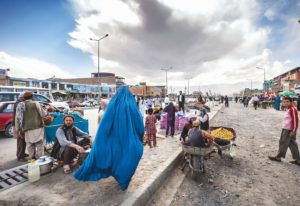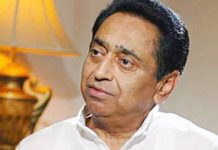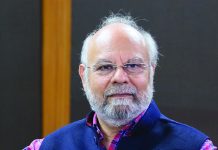 International observers across the world are concerned whether the already-delayed Afghan parliamentary elections could ever be conducted. With the inability of the West-sponsored Kabul government to assert its writ in the country and the growing proximity between the Afghan Talibans and the Russians has worsened situation in the strife-torn country. It is accompanied by the double game of the Pakistani establishment i.e. its army and intelligence agency, ISI, has further complicated the political climate with growing violence in the north-western region of the Indian sub-continent.
International observers across the world are concerned whether the already-delayed Afghan parliamentary elections could ever be conducted. With the inability of the West-sponsored Kabul government to assert its writ in the country and the growing proximity between the Afghan Talibans and the Russians has worsened situation in the strife-torn country. It is accompanied by the double game of the Pakistani establishment i.e. its army and intelligence agency, ISI, has further complicated the political climate with growing violence in the north-western region of the Indian sub-continent.
The great game of power struggle among the big powers comprising USA, Russia and China for controlling this strategic region is now being witnessing with the new alignment of forces. The historical struggle of the northern alliance supported by Iran, India and Russia against the Islamic zealots of Talibans jointly sponsored by USA and Pakistan has undergone changes. The Islamic zealots had played a key role in the fragmentation of the USSR, but the irrepressible group lost its crucial support of West following the terrorists’ activities in Europe and the destruction of the twin towers in New York.
In the obtaining situation Russia under Putin is much closer to the Afghan Talibans and is ready to be a peace broker between Kabul and the Islamic group. The Pakistani establishment, though now having a civilian face of a celebrity in Imran Khan as the new prime minister, is ready to extract maximum funds and resources from the West, especially USA, in the name of negotiating with the Afghan Talibans, which were once trained by its forces to be used against the USSR and then India. The roots of the Kashmir violence could be traced to the Talibans liberally supported by the US funds.
The Americans are unable to handle its client state, Pakistan. In spite of warning and persuasions, its rulers have become past masters in the art of seeking funds from all possible sources by keeping Afghanistan unstable. The West is led, this time, by an unpredictable Donald Trump. It is true that he may not be compared with legendary figures like Dwight D. Eisenhower, Bill Clinton and Richard Nixon. He cannot be compared even with highly intellectual Barrack Obama, but his zeal to resolve the Afghan conflict appear to be irrepressible. He may not have the intellectual support of eminent people like his predecessors had in his administration as Secretary of State such as Hillary Clinton, John Kerry or Henry Kissinger. Yet Trump hopes to succeed with his zeal and energy and with the help of his clever Secretary of State Mike Pompeo, who once headed CIA.
The formidable USA under Trump is unable to restore confidence of its allies in Europe as well as in the rest of the world that it can insist for peace on its terms. The US administration under Trump is facing formidable challenges from the weather-beaten world leaders like Russian Federation president Vladimir Putin and the Chinese president Xi Jinping. It is for the first time since World War-II that the leader of the world’s most powerful cuntry is considered a baccha (kid) or a novice in the chess game of the world politics. He is pitted against weather-beaten leaders like of the Russian Federation president Vladimir Putin or the Chinese president, Xi Jinping.
Within the US establishment, Trump supporters are accused of using some clandestine Russian support during the high-pitch political rhetoric that led to his victory. The allegation of the Russian interference in the US presidential poll is yet to be substantiated, but it is no denying that Putin, a former intelligence officer, is feared across the globe. He has emerged as an undisputed leader of his country. The suspicion that Russians used various methods to malign Clintons, which ultimately helped Trump to occupy White House, was masterminded by Putin’s administration. The apprehension is that Russia wants to destabilise US political system, because Trump’s victory has relegated eminent politicians and those who could influence the world’s global politics.
Amidst these developments, Putin’s visit to India gains significance. In India too, the post 2014 polls has created a power vacuum even within the ruling Bhartiya Janata Party (BJP).Its many veteran leaders are in the political wilderness. The worsening situation in India’s neghbourhood from Male, Sir Lanka to Nepal is alarming, the competence of our career diplomats, various think tanks and leaders like Sushma Swaraj, India’s External Affairs Minister, a proven expert of world affairs, has been trying to safeguard the country’s interests. In spite of the rhetoric against the previous governments, the South Block is pursuing the established perennial foreign policy formulated during the Jawaharlal Nehru days and endorsed by successive governments irrespective of their political outfits. On the other hand, Trump’s administration continues to grope in the international politics.
In this backdrop, Putin’s India visit needs to be assessed and how India is trying to conduct herself in this difficult power game. Prime Minister Narendra Modi, appears to have re-invoked the non-aligned role of India to reassert his country’s interests. It is tough task. For India, it is quite alarming that the traditional conflict between the countries of Western Europe and Russia has reached our threshold in the form of the Afghan mess. The inability of the European powers to play any proactive role, especially under the shadow of the new Sino-Russian understanding, the US initiatives are limited.
During the period of more than two decades, especially following the collapse of the USSR, the US and its allies deliberately expanded its presence in the Russian strongholds. The new trouble spots from the Balkans, Black Sea, West Asia and now Afghanistan have brought the West and Russians in almost a new confrontation mode. The inability of the Western Europe to project a common approach too has restricted initiatives of President Trump. The broad picture in India’s neighborhood is dismal. It causes concerns, if not panic.
Putin is credited for reasserting the Russian power in the international politics, especially in Syria. He has stalemated the West in Ukraine. The Americans and its NATO allies could not reassert their victory of 1854-55, when the Western nations had revenged the defeat of Napoleon, by trouncing the British-led coalition forces of France and Turkey in the Ceriman war. Turkey, a strong ally of the West, is now closer to Russian Federation. The Russians have also tried to woo Greece by invoking common religious belief of being follower of the Orthodox Church.
For the Indian negotiators, Putin appears to be much better than some of the leaders of the erstwhile USSR. He is so well-versed in international affairs that he cannot be bracketed with Kosygin, USSR prime minister, who had almost forced Indian Prime Minister Lal Bahadur Shastry to return all the areas wrested from Pakistan in the 1965 war. In spite of restoring territories to Pakistan, Kossygin could not win any political constituency in the Islamic country. In fact, Pakistan soon forgot the crucial Russian support and continued to send Islamic terrorists to India’s north-eastern region via its Eastern province, now Bangladesh.
It also trained Islamic terrorists, including Chechen Islamic terrorists, which the West describes as freedom fighters and Pakistan endorses it. Putin and his country could not forget the dark night of October 23, 2002, when these terrorists had seized the prestigious Dubroka theatre centre in Moscow and massacred or maimed nearly 200 people. They believed to have links with the Pakistani-based al Qaeda to conduct international terrorist operations abroad. A matured Putin has adopted the policy of having patience with Pakistan, while it is being abandoned by the West. The great game has begun.
Putin was in the team of Yeltsin, when the 1971 Peace and Friendship treaty between India and USSR was revised. On the insistence of the Russians, the security clause in the treaty, which had helped in redrawing the political geography of the Indian subcontinent, was removed. Since many compare him with Tsar Alexander-II, who had wrested Outer Manchuria from the Chinese in 1858-1860, it needs to be carefully monitored how under Putin, the Russian Federation, plays its role in the India sub-continent.
The growing assertion of Russians in the world politics has resurfaced almost after a gap of 25 years. USA and its allies in the Western Europe have been enjoying immense power in a US-dominated uni-polar world following the eclipse of USSR. During this period, West has failed to restore any substantial peace in the world, but it used its economic and military might to make inroads in the countries which were under the influence of USSR or were maintaining neutral positions. Both Russia and China are increasingly challenging this hegemony. The apprehension of this new alliance appears to have echoed in the recent outbursts against some alleged Russian spy network using chemical weapons or hacking websites indicates new battle lines being adopted against Putin’s Russia.
A New York Times news published on October 4, 2018, claims that Russian intelligence officers having proximity to Putin have launched cyber attacks against organisations around the globe that challenged Russian wrongdoing, exposed Kremlin disinformation campaigns or took on President Vladimir V. Putin. It further claimed that the officers operating near Red Square sought to hack the British foreign ministry, anti-doping agencies in Colorado Springs and Canada, and investigators examining the shooting down of a Malaysian passenger jet over Ukraine in 2014, the officials said.
Other Russian officers armed with mobile computer equipment traveled to the Netherlands in April to tap into the headquarters of the world’s chemical weapons watchdog, which was investigating the poisoning in Britain of a Russian former spy. Earlier, in January 2017, the Office of the Director of National Intelligence (ODNI) had stated Putin favoured trump over Hillary Clinton in the presidential elections. A number of countries in the European Union too have clamped sanctions against Russia under the pretext that the state is supporting terrorism and interfering in their own elections.
The ongoing power game in the various parts of Asia and Europe sometimes reminds us of the popular 1966 Hollywood comedy, The Russians are coming. The movie revolves around the story of landing of a Russian submarine on the shores of New England in USA. The apprehensions in the minds of the Western powers have resurfaced. The British colonial power was apprehensive of Alaxander-III, who successfully had expanded the Tsar Empire to Central Asia.
The British stopped the Russian march to the warm water of the Indian Ocean, which is still called the great game. The months of September-October 2018 only betrays the growing suspicion against Putin and his designs. He arrives in India and assures the state-of-art weapons to India that too without insisting Indian support for his initiative in the delayed talks with Afghan Talibans on the eve of the Afghan polls. Putin is one of patient world leaders, who knows his strategy to make necessary moves in the world’s chess board.
In the ongoing power game, West and India are jointly helping the present Kabul regime bravely challenging the growing influence of Talibans. Earlier, the Afghan conflict proved a huge financial gain for Pakistan, but there is a growing trust-deficit between West and Pakistan. While USA is insisting to do more asking Pakistan to bring the Talibans trained in its backyard, it gave a jolt to the Pakistani establishment by re-deploying its trusted emissary, Khalilzad, to initiate negotiations with the Afghan Talibans. Earlier, this 67-year old US diplomat of Afghan origin known as King Zal had served as an aide to President George W. Bush following the September 11, 2001 attack of Al Qaeda and other Afghanistan-based Islamic terrorists groups.
The secret talks of the Afghan government representatives with Talibans have been initiated in Saudi Arabia. Meanwhile, the Pakistani efforts to rope in Russia in the Afghan talks could not materialise due to the Afghan reluctance. The Afghan leader, Ashraf Ghani, communicated the inability of Afghans to initiate talks to the Russian foreign minister, Sergei Lavrov. The great game in this strategic region may cause new conflicts, but the USA is no more the single player. The Russians are now more assertive. It is to be seen whether the delayed Afghan parliamentary elections, which were scheduled in October 2016, could ever take place. However, the Afghan government has promised to hold them on October 2018.
letters@tehelka.com













